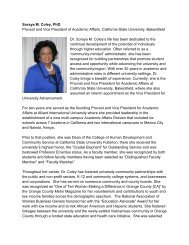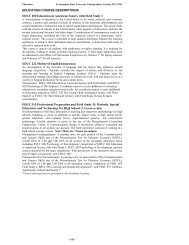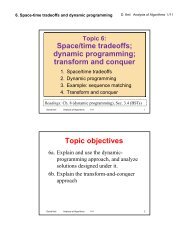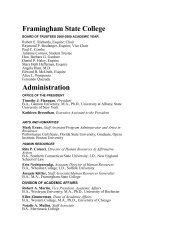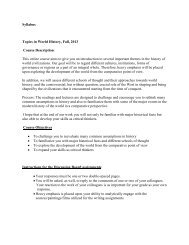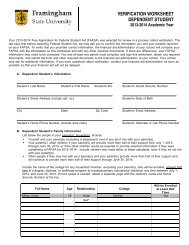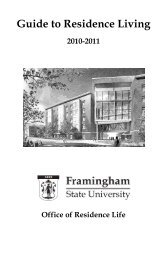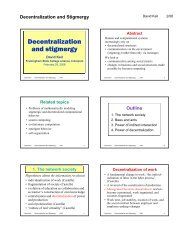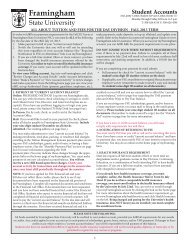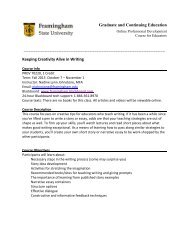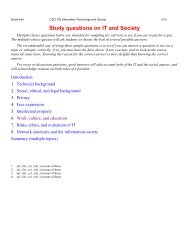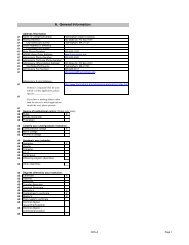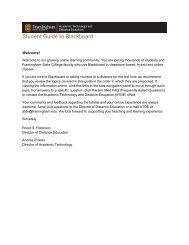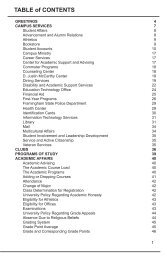Entrapment in the Literature of Edith Wharton - Framingham State ...
Entrapment in the Literature of Edith Wharton - Framingham State ...
Entrapment in the Literature of Edith Wharton - Framingham State ...
Create successful ePaper yourself
Turn your PDF publications into a flip-book with our unique Google optimized e-Paper software.
<strong>Entrapment</strong> <strong>in</strong> <strong>the</strong> <strong>Literature</strong> <strong>of</strong> <strong>Edith</strong> <strong>Wharton</strong><br />
Cory Welch<br />
Department <strong>of</strong> English<br />
EDITH WHARTON (1862-1937) IS HIGHLY REGARDED AS ONE OF THE MAJOR FIGURES OF<br />
AMERICAN LITERATURE. SEVERAL OF HER WORKS, AMONG THEM THE HOUSE OF MIRTH,<br />
ETHAN FROME, THE CUSTOM OF THE COUNTRY, AND THE AGE OF INNOCENCE, RANK AMONG<br />
THE FINEST AMERICAN NOVELS EVER WRITTEN. THE PUBLICATION OF THE HUGELY POPULAR<br />
THE HOUSE OF MIRTH, IN 1905, LAUNCHED A SUCCESSFUL LITERARY CAREER FOR WHARTON<br />
IN WHICH SHE ULTIMATELY PUBLISHED OVER FORTY BOOKS OF ESSAYS, TRAVELOGUES,<br />
SHORT STORY COLLECTIONS, AND, OF COURSE, NOVELS. IN 1920, WHARTON WAS AWARDED<br />
THE PULITZER PRIZE FOR THE AGE OF INNOCENCE.<br />
EDITH WHARTON IS ACCLAIMED FOR HER BRILLIANT AND SCATHING PORTRAITS OF<br />
ARISTOCRATIC NEW YORK SOCIETY, WHICH HAS ATTRACTED FREQUENT COMPARISONS TO<br />
ANOTHER GREAT AMERICAN WRITER, WHARTON’S FRIEND AND CONTEMPORARY HENRY<br />
JAMES. YET SHE HAS ALSO GARNERED CONSIDERABLE ACCLAIM FOR HER PORTRAYALS OF<br />
THE WORKING-CLASS CITIZENRY AND THEIR OWN CIRCUMSTANCES IN DESOLATE, RURAL<br />
WESTERN MASSACHUSETTS, IN WHAT ARE OFTEN CALLED HER “NEW ENGLAND NOVELS”—<br />
SUMMER AND THE POWERFUL ETHAN FROME. CRITICAL RECEPTION OF EDITH WHARTON<br />
HAS TENDED TO FOCUS EITHER ON HER THREE MAJOR HIGH SOCIETY NOVELS (THE HOUSE<br />
OF MIRTH, THE CUSTOM OF THE COUNTRY, AND THE AGE OF INNOCENCE) OR ON HER NEW<br />
ENGLAND WORKS.<br />
CORY WELCH’S ESSAY, “ENTRAPMENT IN THE LITERATURE OF EDITH WHARTON,” SEEKS TO<br />
BRIDGE A CRITICAL DIVIDE THAT HAS STUMPED EDITH WHARTON’S CRITICS FOR NEARLY A<br />
CENTURY. THE ESSAY SEEKS TO UNCOVER MAJOR THEMES IN EDITH WHARTON’S WORK NOT<br />
EXCLUSIVE TO EITHER THE NEW ENGLAND NOVELS OR THE NEW YORK NOVELS. WELCH<br />
EXAMINES THE ENTRAPMENT AND ISOLATION OF THE INDIVIDUAL WITHIN MORAL AND<br />
SOCIETAL CONSTRUCTS IN WHARTON’S NOVELS, AND EXPLORES THE EXISTENTIAL<br />
IMPLICATIONS AND RELEVANCE OF WHARTON’S ARTISTIC VISION FOR THE TWENTY-FIRST<br />
CENTURY READER.<br />
The most remarkable th<strong>in</strong>g about a century‟s worth <strong>of</strong> <strong>Edith</strong> <strong>Wharton</strong> criticism has been<br />
its sheer <strong>in</strong>ability to strike at <strong>the</strong> heart <strong>of</strong> her literature. The art <strong>of</strong> any great literary<br />
figure will resist easy def<strong>in</strong>ition, but <strong>the</strong> attempts to nail <strong>Edith</strong> <strong>Wharton</strong> down to one or<br />
two great “<strong>the</strong>mes” have led too many critics to blatantly disregard contradictory facets<br />
<strong>of</strong> her work—especially those facets which tend to discredit <strong>the</strong>ir own <strong>the</strong>ories regard<strong>in</strong>g<br />
Mrs. <strong>Wharton</strong>‟s work.
Hence, we have <strong>the</strong> sticky situation <strong>of</strong> one critic, Elizabeth Ammons, proclaim<strong>in</strong>g that<br />
<strong>Wharton</strong>‟s work “records her public argument with America on <strong>the</strong> issue <strong>of</strong> freedom for<br />
women over more than three decades” (Ammons ix), while apparently forgett<strong>in</strong>g or<br />
disregard<strong>in</strong>g <strong>the</strong> fact that <strong>the</strong> protagonists <strong>of</strong> two <strong>of</strong> <strong>Wharton</strong>‟s most important novels,<br />
Ethan Frome and The Age <strong>of</strong> Innocence, are men. Or we have ano<strong>the</strong>r critic, Irv<strong>in</strong>g<br />
Howe, who claims that “Mrs. <strong>Wharton</strong>‟s great <strong>the</strong>me—<strong>the</strong> dispossession <strong>of</strong> <strong>the</strong> old New<br />
York aristocracy by <strong>the</strong> vulgar new rich—is not quite so visible <strong>in</strong> The House <strong>of</strong> Mirth as<br />
<strong>in</strong> The Custom <strong>of</strong> <strong>the</strong> Country or The Age <strong>of</strong> Innocence” (Howe 122). Of course, <strong>in</strong><br />
order for <strong>Wharton</strong>‟s great <strong>the</strong>me to be, <strong>in</strong> fact, <strong>the</strong> dispossession <strong>of</strong> <strong>the</strong> old aristocracy<br />
by <strong>the</strong> noveau riche, we would have to overlook <strong>the</strong> very existence <strong>of</strong> <strong>Wharton</strong>‟s two<br />
great “New England” novels, Summer and Ethan Frome, which obviously concern<br />
nei<strong>the</strong>r members <strong>of</strong> <strong>the</strong> old aristocracy nor members <strong>of</strong> <strong>the</strong> “vulgar new rich.” Only <strong>the</strong><br />
most supremely skilled sophist would be able to underwrite Summer and Ethan Frome,<br />
set amidst <strong>the</strong> poor work<strong>in</strong>g classes <strong>in</strong> <strong>the</strong> Berkshires <strong>of</strong> Massachusetts, with <strong>the</strong> New<br />
York <strong>the</strong>me <strong>of</strong> old versus new society.<br />
A peculiar <strong>of</strong>fshoot to <strong>the</strong> criticism <strong>of</strong> upper-class mores, <strong>in</strong>cidentally, has been <strong>the</strong><br />
robust cottage <strong>in</strong>dustry <strong>of</strong> Henry James-<strong>Edith</strong> <strong>Wharton</strong> parallelism. This sort <strong>of</strong> criticism<br />
relegates <strong>Wharton</strong>‟s art to secondary status when placed next to James‟s<br />
achievements, imply<strong>in</strong>g that <strong>Wharton</strong>, for <strong>the</strong> length <strong>of</strong> her career, sought only to<br />
replicate <strong>the</strong> complexity <strong>of</strong> James‟s own portrayals <strong>of</strong> <strong>the</strong> dynamics <strong>of</strong> an evolv<strong>in</strong>g<br />
society. This criticism <strong>of</strong>ten <strong>in</strong>volves lengthy analyses <strong>of</strong> <strong>Wharton</strong>‟s attempt to imitate<br />
(or even transcend!) James‟s “novel <strong>of</strong> manners,” and <strong>the</strong>re is all too <strong>of</strong>ten <strong>the</strong><br />
acknowledgment that <strong>Wharton</strong> is merely second- or third-rate James—that her literature<br />
will forever subside <strong>in</strong> <strong>the</strong> shadows <strong>of</strong> that great American novelist. Sett<strong>in</strong>g aside <strong>the</strong><br />
condescend<strong>in</strong>g, limit<strong>in</strong>g assumption that a woman‟s art is merely a variation <strong>of</strong> a man‟s<br />
art, <strong>the</strong> James-<strong>Wharton</strong> angle <strong>of</strong>ten emphasizes <strong>the</strong> “novel <strong>of</strong> manners” components <strong>of</strong><br />
<strong>Wharton</strong>‟s work and her abilities (or <strong>in</strong>abilities) to effectively portray <strong>the</strong> erosion <strong>of</strong><br />
traditional aristocratic values by <strong>the</strong> cruder values <strong>of</strong> new money. The result is that The<br />
Custom <strong>of</strong> <strong>the</strong> Country is situated as <strong>Wharton</strong>‟s masterpiece—it is <strong>the</strong> novel that does<br />
James one better. In her essay “Henry James‟s Heiress” (whose title perfectly
embodies <strong>the</strong> patriarchal assumptions <strong>of</strong> James-<strong>Wharton</strong> criticism), Q.D. Leavis<br />
pronounces that The Custom <strong>of</strong> <strong>the</strong> Country “is undoubtedly her masterpiece . . . Here<br />
<strong>the</strong> <strong>the</strong>me is explicitly „social dis<strong>in</strong>tegration‟” (Leavis 79). Not only is Leavis herself<br />
lay<strong>in</strong>g claim to <strong>Wharton</strong>‟s (i.e., James‟s) great <strong>the</strong>me—that <strong>of</strong> “social dis<strong>in</strong>tegration”—<br />
but she is significantly overlook<strong>in</strong>g <strong>the</strong> obvious lack <strong>of</strong> upper-class turmoil <strong>in</strong> Ethan<br />
Frome and Summer while severely misread<strong>in</strong>g The Age <strong>of</strong> Innocence and The House <strong>of</strong><br />
Mirth, which at <strong>the</strong> very least are more concerned with <strong>the</strong> plights <strong>of</strong> an <strong>in</strong>dividual with<strong>in</strong><br />
a society (be it a Newland Archer or a Lily Bart) than with <strong>the</strong> so-called dis<strong>in</strong>tegration <strong>of</strong><br />
that society itself.<br />
Recent fem<strong>in</strong>ist criticism has mercifully sought to right some obvious wrongs<br />
surround<strong>in</strong>g James-<strong>Wharton</strong> parallelism, but <strong>the</strong> considerable fem<strong>in</strong>ist criticism <strong>of</strong> <strong>Edith</strong><br />
<strong>Wharton</strong>‟s work that has arisen <strong>in</strong> <strong>the</strong> last thirty or so years has taken a variety <strong>of</strong> angles<br />
that tend to overlook certa<strong>in</strong> o<strong>the</strong>r contradictions <strong>in</strong> <strong>Wharton</strong>‟s work. For example,<br />
Ammons‟s contention that <strong>the</strong> true focus <strong>of</strong> <strong>Wharton</strong>‟s fiction is <strong>the</strong> plight <strong>of</strong> women<br />
would have to downplay <strong>the</strong> plights <strong>of</strong> <strong>the</strong> male protagonists <strong>of</strong> Ethan Frome and The<br />
Age <strong>of</strong> Innocence, or would have to overlook <strong>Wharton</strong>‟s highly sympa<strong>the</strong>tic portrayal <strong>of</strong><br />
Ralph <strong>in</strong> The Custom <strong>of</strong> <strong>the</strong> Country, or even her somewhat sensitive portrait <strong>of</strong> Mr.<br />
Royall <strong>in</strong> Summer. Similarly, Wai Chee Dimock‟s criticism, that <strong>Wharton</strong> sees marriage<br />
as <strong>the</strong> marketable asset for women with<strong>in</strong> <strong>the</strong> construct <strong>of</strong> a capitalist society (67), is<br />
hardly applicable to <strong>the</strong> more subtly def<strong>in</strong>ed relationships <strong>of</strong> <strong>the</strong> New England books,<br />
where capitalist greed is not <strong>the</strong> underly<strong>in</strong>g social constra<strong>in</strong>t.<br />
Indeed, <strong>the</strong> body <strong>of</strong> criticism that praises <strong>Wharton</strong>‟s castigation or outright satirization <strong>of</strong><br />
New York society, or that commends her subtle portrayals <strong>of</strong> <strong>the</strong> shift<strong>in</strong>g social and<br />
economic dynamics <strong>of</strong> <strong>the</strong> upper-class society, tends to disregard <strong>Wharton</strong>‟s equally<br />
careful portraiture, <strong>in</strong> her New England books, <strong>of</strong> <strong>the</strong> circumstances <strong>of</strong> an entirely<br />
different social class and milieu. And if <strong>the</strong> criticism surround<strong>in</strong>g <strong>the</strong> famous New York<br />
novels (The House <strong>of</strong> Mirth, The Custom <strong>of</strong> <strong>the</strong> Country, and The Age <strong>of</strong> Innocence)<br />
bli<strong>the</strong>ly pronounces bold <strong>Wharton</strong> <strong>the</strong>mes on class and society without regard to <strong>the</strong><br />
New England novels, <strong>the</strong> critics <strong>of</strong> Ethan Frome and Summer are guilty <strong>of</strong> <strong>the</strong> same
crime <strong>in</strong> regards <strong>the</strong> New York books. These critics see <strong>the</strong> New England books as<br />
famous anomalies <strong>in</strong> <strong>Wharton</strong>‟s career—which only re<strong>in</strong>forces a notion that <strong>the</strong>y are,<br />
<strong>in</strong>deed, anomalies <strong>in</strong> <strong>Wharton</strong>‟s career. One critic <strong>of</strong> Summer, Kathleen Pfeiffer,<br />
articulates <strong>the</strong> divide between <strong>the</strong> two camps whilst simultaneously conced<strong>in</strong>g <strong>the</strong><br />
existence <strong>of</strong> an apparently unbridgeable divide between <strong>the</strong> books: “The discomfort [<strong>of</strong><br />
critics to contend with Summer] may be rooted <strong>in</strong> Summer‟s dramatic departure from<br />
<strong>the</strong> novel <strong>of</strong> manners, <strong>the</strong> genre through which <strong>Wharton</strong> ga<strong>in</strong>ed popularity. I believe<br />
that Summer is anomalous <strong>in</strong> <strong>Wharton</strong>‟s oeuvre . . .” (Pfeiffer 142). The major flaw <strong>in</strong><br />
<strong>Wharton</strong> criticism is its <strong>in</strong>ability to connect <strong>the</strong> seem<strong>in</strong>gly disparate social tableaux <strong>of</strong><br />
her novels with certa<strong>in</strong> overrid<strong>in</strong>g <strong>the</strong>matic elements unique to all <strong>of</strong> her novels—with<br />
<strong>the</strong> result that critics sound more comfortable divid<strong>in</strong>g <strong>Wharton</strong>‟s work <strong>in</strong>to dist<strong>in</strong>ctive<br />
genres ra<strong>the</strong>r than see<strong>in</strong>g what makes her tick through all her major fiction, New<br />
England and New York novels alike.<br />
In truth, <strong>Wharton</strong>‟s literature is uniquely existential. If <strong>the</strong>re is <strong>in</strong>deed a major <strong>the</strong>me that<br />
unites <strong>the</strong> two very different and seem<strong>in</strong>gly unrelated socio-economic milieus <strong>of</strong><br />
<strong>Wharton</strong>‟s great fiction, it is <strong>the</strong> pervasive <strong>the</strong>me <strong>of</strong> absolute entrapment and isolation.<br />
An <strong>in</strong>dividual‟s entrapment with<strong>in</strong> his or her unique social situation is <strong>the</strong> <strong>Wharton</strong> <strong>the</strong>me<br />
that transcends accepted paradigms <strong>of</strong> class, gender, and social dynamics—paradigms<br />
that have too <strong>of</strong>ten been narrowly used to def<strong>in</strong>e her literature. In all <strong>of</strong> <strong>Wharton</strong>‟s<br />
fiction—whe<strong>the</strong>r its concerns be upper-class New York or work<strong>in</strong>g-class Berkshires,<br />
whe<strong>the</strong>r <strong>the</strong> characters are men or women, whe<strong>the</strong>r <strong>the</strong> genre is a novel <strong>of</strong> manners <strong>in</strong><br />
high-society New York or an allegory <strong>of</strong> forbidden love <strong>in</strong> w<strong>in</strong>try (or summery) New<br />
England—her characters are ultimately trapped by social circumstances beyond <strong>the</strong>ir<br />
control or by moral circumstances <strong>of</strong> <strong>the</strong>ir own mak<strong>in</strong>g. Existential entrapment def<strong>in</strong>es<br />
<strong>Edith</strong> <strong>Wharton</strong>‟s great fiction, connect<strong>in</strong>g characters as unlike one ano<strong>the</strong>r as Lily Bart<br />
and Ethan Frome, or Newland Archer and Und<strong>in</strong>e Spragg. In a sense, <strong>Wharton</strong>‟s great<br />
novels are variations on a tragic <strong>the</strong>me. <strong>Wharton</strong>‟s targets are not so much <strong>the</strong> social<br />
systems <strong>of</strong> New York or <strong>the</strong> Berkshires—though she carefully, subtly, sometimes<br />
brilliantly critiques <strong>the</strong> shift<strong>in</strong>g social and cultural dynamics <strong>in</strong> our society as few<br />
American novelists have. <strong>Wharton</strong> is most concerned <strong>in</strong> her art with <strong>the</strong> hopelessness
<strong>of</strong> an <strong>in</strong>dividual‟s social and moral <strong>in</strong>teractions with society—an issue as supremely<br />
relevant <strong>in</strong> <strong>the</strong> early twenty-first century as it was when <strong>Wharton</strong> began publish<strong>in</strong>g<br />
novels a century ago.<br />
It should come as no surprise that so many <strong>of</strong> <strong>Edith</strong> <strong>Wharton</strong>‟s characters are endowed<br />
with an <strong>in</strong>herent need to somehow better <strong>the</strong>ir lives <strong>in</strong> one sense or ano<strong>the</strong>r, be it<br />
f<strong>in</strong>ancially, emotionally, or <strong>in</strong>tellectually. Already, <strong>Wharton</strong> is suggest<strong>in</strong>g, <strong>the</strong>se<br />
characters seek some form <strong>of</strong> escape from <strong>the</strong>ir current lives. There is Und<strong>in</strong>e Spragg,<br />
for <strong>in</strong>stance, who hopes to better her life <strong>in</strong> purely socio-economic terms as she<br />
relentlessly climbs rung after rung up <strong>the</strong> social ladder. Similarly, Lily Bart‟s quest for<br />
marriage is <strong>in</strong> fact a personal quest for social and emotional betterment from her “old<br />
maid” situation. It is no co<strong>in</strong>cidence, also, that many <strong>of</strong> <strong>Wharton</strong>‟s ma<strong>in</strong> characters take<br />
refuge <strong>in</strong> books or libraries—Lawrence Selden fasc<strong>in</strong>ates Lily with his curious m<strong>in</strong>d and<br />
his great <strong>in</strong>terest <strong>in</strong> books; Newland Archer‟s personal refuge is his own study and his<br />
newly arrived shipments <strong>of</strong> books; Ralph splits his writ<strong>in</strong>g dreams between be<strong>in</strong>g a<br />
great literary critic or a great poet; even Charity f<strong>in</strong>ds herself work<strong>in</strong>g idly <strong>in</strong> a public<br />
library amidst <strong>the</strong> dusty, lonely stacks. So many <strong>of</strong> <strong>Wharton</strong>‟s characters are driven by<br />
a conception that <strong>the</strong>re is a better life, a better world, a better place beyond <strong>the</strong>ir current<br />
circumstances. This is <strong>the</strong> seed that <strong>Wharton</strong> plants <strong>in</strong> virtually all <strong>the</strong> major characters<br />
throughout her novels, allow<strong>in</strong>g her to pit a character‟s dreams aga<strong>in</strong>st a character‟s<br />
realities.<br />
Ethan Frome, like so many <strong>of</strong> <strong>Wharton</strong>‟s protagonists or ma<strong>in</strong> characters, is <strong>in</strong>itially<br />
driven by <strong>in</strong>tellectual precocity—a curiosity to see <strong>the</strong> world outside his narrow slice <strong>of</strong><br />
society, to engage his m<strong>in</strong>d <strong>in</strong> understand<strong>in</strong>g <strong>the</strong> greater mysteries <strong>of</strong> <strong>the</strong> world, to be<br />
“aware <strong>of</strong> huge cloudy mean<strong>in</strong>gs beh<strong>in</strong>d <strong>the</strong> daily face <strong>of</strong> th<strong>in</strong>gs” (EF 13). Early <strong>in</strong> Ethan<br />
Frome, <strong>Wharton</strong> forcefully establishes Ethan‟s own sense that he might belong <strong>in</strong> a<br />
place well outside <strong>the</strong> barrenness <strong>of</strong> Starkfield—<strong>in</strong> <strong>the</strong> open<strong>in</strong>g pages <strong>of</strong> <strong>the</strong> story, old<br />
Ethan surprises <strong>the</strong> narrator by show<strong>in</strong>g an <strong>in</strong>terest <strong>in</strong> a volume <strong>of</strong> popular science. We<br />
soon discover that <strong>the</strong> young Ethan is attracted to a bigger world—<strong>in</strong> this case, to a<br />
world <strong>of</strong> culture and ideas far removed from a difficult Berkshires life:
He had always wanted to be an eng<strong>in</strong>eer, and to live <strong>in</strong> towns, where <strong>the</strong>re were<br />
lectures and big libraries and “fellows do<strong>in</strong>g th<strong>in</strong>gs.” A slight eng<strong>in</strong>eer<strong>in</strong>g job, put<br />
<strong>in</strong> his way dur<strong>in</strong>g his period <strong>of</strong> study at Worcester, <strong>in</strong>creased his faith <strong>in</strong> his ability<br />
as well as his eagerness to see <strong>the</strong> world[.] (30)<br />
The <strong>in</strong>itial seeds <strong>of</strong> Ethan Frome‟s tragedy are planted <strong>in</strong> this <strong>in</strong>herent curiosity, this<br />
belief <strong>in</strong> engag<strong>in</strong>g with a world larger than Starkfield. Even after several long w<strong>in</strong>ters <strong>in</strong><br />
Starkfield, even after his troubles with Zeena beg<strong>in</strong>, “[<strong>the</strong>re] was <strong>in</strong> him a slumber<strong>in</strong>g<br />
spark <strong>of</strong> sociability which <strong>the</strong> Starkfield w<strong>in</strong>ters had not yet ext<strong>in</strong>guished” (30). This<br />
vibrant, youthful ambition <strong>in</strong> Ethan‟s character makes up <strong>the</strong> backbone aga<strong>in</strong>st which<br />
larger, more powerful social and moral forces will conspire. <strong>Wharton</strong>‟s very direct<br />
establishment <strong>of</strong> Ethan Frome‟s hope to achieve a better life allows her to trap him<br />
with<strong>in</strong> <strong>the</strong> harsh reality <strong>of</strong> his circumstances, and his plight is all <strong>the</strong> more tragic<br />
because it is set aga<strong>in</strong>st a strong <strong>in</strong>itial yearn<strong>in</strong>g to escape.<br />
And <strong>Wharton</strong> provides for Ethan, as she does for so many <strong>of</strong> her protagonists, a social<br />
background that colludes to fully ensnare him <strong>in</strong> circumstances that will powerfully<br />
contribute to <strong>the</strong> absolute, nightmarish entrapment that closes <strong>the</strong> short novel. Ethan‟s<br />
social circumstances, situations beyond his control, beg<strong>in</strong> to pull him away from his<br />
hopeful future as an eng<strong>in</strong>eer: “His fa<strong>the</strong>r‟s death, and <strong>the</strong> misfortunes follow<strong>in</strong>g it, put a<br />
premature end to Ethan‟s studies” (13). On <strong>the</strong> heels <strong>of</strong> that sudden death, Ethan‟s<br />
mo<strong>the</strong>r falls ill, and <strong>Wharton</strong>‟s language already beg<strong>in</strong>s to connect Ethan‟s social straits<br />
with a forebod<strong>in</strong>g sense <strong>of</strong> entrapment and isolation: “Left alone . . . to carry <strong>the</strong> burden<br />
<strong>of</strong> farm and mill, he had no time for convivial loiter<strong>in</strong>gs <strong>in</strong> <strong>the</strong> village; and when his<br />
mo<strong>the</strong>r fell ill <strong>the</strong> lonel<strong>in</strong>ess <strong>of</strong> <strong>the</strong> house grew more oppressive than that <strong>of</strong> <strong>the</strong> fields”<br />
(29). Soon after, his marriage to <strong>the</strong> seem<strong>in</strong>gly robust and car<strong>in</strong>g Zeena—a woman<br />
who “let her husband see from <strong>the</strong> first that life on an isolated farm was not what she<br />
had expected when she married”—soon becomes an overwhelm<strong>in</strong>g form <strong>of</strong><br />
imprisonment for Ethan, as she refuses to move to larger towns “which looked down on<br />
her,” and develops her morbid “sickl<strong>in</strong>ess” to which Ethan will forever feel cha<strong>in</strong>ed (30).
The <strong>Wharton</strong>-constructed layers <strong>of</strong> s<strong>in</strong>gularly destructive social happenstance seem<br />
almost designed to prevent Ethan from atta<strong>in</strong><strong>in</strong>g any sense <strong>of</strong> personal escape.<br />
It is amus<strong>in</strong>g to see Lionel Trill<strong>in</strong>g castigate <strong>Edith</strong> <strong>Wharton</strong> for <strong>in</strong>flict<strong>in</strong>g what he believes<br />
is unnecessary cruelty on her characters <strong>in</strong> Ethan Frome —for not endow<strong>in</strong>g <strong>the</strong>m with<br />
<strong>the</strong> qualities necessary to break free <strong>of</strong> <strong>the</strong>ir limit<strong>in</strong>g environments. In all <strong>the</strong> great<br />
literature, Trill<strong>in</strong>g argues—<strong>in</strong> Dickens and Joyce and Balzac and Dostoevsky, for<br />
example—<strong>the</strong> literary protagonists are imbued with qualities that allow <strong>the</strong>m, “by<br />
courage and choice,” to break free <strong>of</strong> <strong>the</strong>ir “brute circumstances” (129). <strong>Wharton</strong>,<br />
Trill<strong>in</strong>g says, has nei<strong>the</strong>r <strong>the</strong> heart nor <strong>the</strong> morality to endow her characters with such<br />
attributes. As a result, he believes, “one cannot fail to see [<strong>in</strong> <strong>Wharton</strong>] a limitation <strong>of</strong><br />
heart, and this limitation makes itself manifest as a literary and moral deficiency <strong>of</strong> her<br />
work”:<br />
Whenever <strong>the</strong> characters <strong>of</strong> a story suffer, <strong>the</strong>y do so at <strong>the</strong> behest <strong>of</strong> <strong>the</strong><br />
author— <strong>the</strong> author must justify his cruelty by <strong>the</strong> seriousness <strong>of</strong> his moral<br />
<strong>in</strong>tention. The author <strong>of</strong> Ethan Frome . . . could not lay claim to any such<br />
justification. Her <strong>in</strong>tention <strong>in</strong> writ<strong>in</strong>g <strong>the</strong> story was not adequate to <strong>the</strong> dreadful<br />
fate she contrived for her characters . . . [In Ethan Frome] a perpetuity <strong>of</strong><br />
suffer<strong>in</strong>g memorializes a moment <strong>of</strong> passion. It is terrible to contemplate, it is<br />
unforgettable, but <strong>the</strong> m<strong>in</strong>d can do noth<strong>in</strong>g with it, can only endure it. [. . .] In <strong>the</strong><br />
context <strong>of</strong> morality <strong>the</strong>re is noth<strong>in</strong>g to say about Ethan Frome. It presents no<br />
moral issue at all. (126)<br />
Trill<strong>in</strong>g harshly accuses <strong>Wharton</strong> <strong>of</strong> possess<strong>in</strong>g a “limitation <strong>of</strong> <strong>the</strong> heart” and “moral<br />
deficiency” because she has presented, <strong>in</strong> Ethan Frome, a brutish situation from which<br />
<strong>the</strong> characters cannot extricate <strong>the</strong>mselves. It should be worth not<strong>in</strong>g, though, that<br />
Trill<strong>in</strong>g assumes great literature to only be “moral” when literary characters‟ dest<strong>in</strong>ies<br />
are commensurate to fac<strong>in</strong>g down <strong>the</strong>ir social circumstances. That Trill<strong>in</strong>g feels forced<br />
to “endure” <strong>the</strong> suffer<strong>in</strong>gs <strong>of</strong> Ethan and Mattie and Zeena is unusual <strong>in</strong> its unwill<strong>in</strong>gness<br />
to accept <strong>the</strong> s<strong>in</strong>gularly existentialist design <strong>of</strong> Ethan Frome.
It would be <strong>in</strong>correct, though, to say that Ethan Frome “presents no moral issue at all,”<br />
because Ethan and Mattie‟s attempts to break free <strong>of</strong> <strong>the</strong>ir environment reflect a<br />
dist<strong>in</strong>ctive morality <strong>of</strong> choice. As <strong>Edith</strong> <strong>Wharton</strong> encloses and isolates her characters<br />
throughout all her novels from any sort <strong>of</strong> true personal freedom, she presents <strong>the</strong>m<br />
with a series <strong>of</strong> moral choices that might lead to freedom, to escape. It should be noted<br />
that <strong>the</strong>se choices are more <strong>of</strong>ten than not presented under <strong>the</strong> aegis <strong>of</strong> a potential<br />
lover forbidden by society—an Ellen Olenska, a Lawrence Selden, a Mr. Royal, a<br />
Mattie. Never<strong>the</strong>less, <strong>the</strong> moral choices any given character makes ultimately consigns<br />
him or her to a fate <strong>of</strong> absolute entrapment. In <strong>Wharton</strong>, <strong>the</strong> morality beh<strong>in</strong>d <strong>the</strong> escape<br />
only serves to trap her characters more completely.<br />
After an even<strong>in</strong>g alone with Mattie (a chaste even<strong>in</strong>g, contrary to popular<br />
misrepresentation), and after a returned Zeena drives home to him what his life has<br />
become—and what <strong>the</strong> rest <strong>of</strong> his life might be—Ethan conceives <strong>of</strong> escap<strong>in</strong>g with<br />
Mattie, escap<strong>in</strong>g from his circumstances forever:<br />
He knew a case <strong>of</strong> a man over <strong>the</strong> mounta<strong>in</strong>—a young fellow <strong>of</strong> about his own<br />
age—who had escaped from just such a life <strong>of</strong> misery by go<strong>in</strong>g West with <strong>the</strong> girl<br />
he cared for . . . Ethan was fired by <strong>the</strong> thought. Why should he not leave with<br />
Mattie <strong>the</strong> next day, <strong>in</strong>stead <strong>of</strong> lett<strong>in</strong>g her go alone? (54)<br />
Ethan‟s burn<strong>in</strong>g desire to escape is palpable, and much <strong>of</strong> <strong>the</strong> suspense from here to<br />
<strong>the</strong> end <strong>of</strong> <strong>the</strong> little novel revolves especially around our own hopes that Ethan will go<br />
through with it. But <strong>Wharton</strong> has someth<strong>in</strong>g else <strong>in</strong> store for us. As Ethan writes his<br />
goodbye note to Zeena, his pen falters, and he runs through <strong>the</strong> moral consequences <strong>of</strong><br />
escap<strong>in</strong>g. It is Ethan‟s consideration <strong>of</strong> those moral consequences, <strong>in</strong> a series <strong>of</strong><br />
spellb<strong>in</strong>d<strong>in</strong>g passages, that proves his undo<strong>in</strong>g—his decision to seriously consider<br />
Zeena‟s position as an abandoned wife, and his decision not to bilk <strong>the</strong> good neighbors<br />
out <strong>of</strong> money, decides Ethan to forget any true attempt at escap<strong>in</strong>g.
Ethan‟s moral decisions ultimately help to def<strong>in</strong>e his absolute entrapment. After<br />
weigh<strong>in</strong>g <strong>the</strong> options—his responsibility to Zeena and <strong>the</strong> farm versus his moral<br />
responsibility to not cheat <strong>the</strong> *neighbors out <strong>of</strong> money—Ethan decides that his<br />
entrapment is <strong>in</strong>evitable:<br />
With <strong>the</strong> sudden perception <strong>of</strong> <strong>the</strong> po<strong>in</strong>t to which his madness had carried him,<br />
<strong>the</strong> madness fell and he saw his life before him as it was. He was a poor man,<br />
<strong>the</strong> husband <strong>of</strong> a sickly woman, whom his desertion would leave alone and<br />
destitute; and even if he had had <strong>the</strong> heart to desert her he could have done so<br />
only by deceiv<strong>in</strong>g two k<strong>in</strong>dly people who had pitied him . . . He turned and walked<br />
slowly back to <strong>the</strong> farm. (58-9)<br />
Ethan‟s tough moral decisions, along with a punish<strong>in</strong>g social environment, have led him<br />
down <strong>the</strong> <strong>in</strong>exorable dest<strong>in</strong>y <strong>of</strong> liv<strong>in</strong>g a life <strong>of</strong> total entrapment, and as punish<strong>in</strong>g as this<br />
short novel can be, it must be read aga<strong>in</strong>st <strong>the</strong> s<strong>in</strong>cerely moral framework that ultimately<br />
guides Ethan‟s decision.<br />
The famous climactic sledd<strong>in</strong>g scene fits snugly <strong>in</strong>to <strong>the</strong> <strong>the</strong>matic project <strong>of</strong> <strong>Wharton</strong>‟s<br />
literature <strong>in</strong> that several <strong>of</strong> her characters have believed that suicide is <strong>the</strong> only way to<br />
truly avoid <strong>the</strong>ir trapped circumstances. In The Custom <strong>of</strong> <strong>the</strong> Country, Ralph kills<br />
himself when he discovers <strong>the</strong> one light <strong>in</strong> his life, his son Paul, has been snatched from<br />
him. In The House <strong>of</strong> Mirth, whe<strong>the</strong>r Lily deliberately kills herself or not is less important<br />
than <strong>the</strong> fact that her horrible plight impels her to her wrecked state, which <strong>in</strong> turn leads<br />
to her death. In Ethan Frome, <strong>in</strong> a fit <strong>of</strong> passionate despair, Ethan assents to Mattie‟s<br />
pleas to end <strong>the</strong>ir lives, and attempts to crash both <strong>of</strong> <strong>the</strong>m <strong>in</strong>to <strong>the</strong> giant oak at <strong>the</strong><br />
bottom <strong>of</strong> <strong>the</strong> hill. That <strong>the</strong> suicide attempt fails is significant—<strong>in</strong> Ethan Frome, even an<br />
attempt to escape entrapment is impossible, and it only leads to a scarier, bleaker form<br />
<strong>of</strong> entrapment than death. It is hardly <strong>the</strong> only po<strong>in</strong>t <strong>in</strong> her literature that <strong>Wharton</strong><br />
suggests that even entrapment cannot be escaped—but it is certa<strong>in</strong>ly <strong>the</strong> darkest.
Newland Archer is, perhaps, <strong>the</strong> <strong>Wharton</strong> character who has it all. In The Age <strong>of</strong><br />
Innocence, <strong>Wharton</strong> has endowed her protagonist with privileged social status,<br />
enormous wealth, a position <strong>of</strong> power and respect with<strong>in</strong> his community, and, <strong>in</strong> May<br />
Welland, a beautiful, dot<strong>in</strong>g, and socially prom<strong>in</strong>ent fiancé and wife. Indeed, <strong>the</strong><br />
protagonists <strong>of</strong> <strong>Wharton</strong>‟s o<strong>the</strong>r novels seem to be seek<strong>in</strong>g all <strong>the</strong> very th<strong>in</strong>gs Newland<br />
actually possesses—he has Ethan‟s education, Und<strong>in</strong>e‟s social position and f<strong>in</strong>ancial<br />
security, and Lily‟s perfect marriage match. True to <strong>the</strong> nature <strong>of</strong> so many <strong>of</strong> <strong>Wharton</strong>‟s<br />
characters, though, Newland seeks <strong>the</strong> th<strong>in</strong>g he does not have, <strong>the</strong> th<strong>in</strong>g he craves<br />
more than anyth<strong>in</strong>g he actually has <strong>in</strong> his life. The man who has everyth<strong>in</strong>g, who<br />
possesses all <strong>the</strong> “positive” attributes his society could possibly expect from anyone, is<br />
<strong>in</strong>herently unhappy with his situation—<strong>in</strong> o<strong>the</strong>r words, Newland is a typical <strong>Wharton</strong><br />
protagonist. Newland Archer is trapped <strong>in</strong> <strong>the</strong> glittery, narrow-m<strong>in</strong>ded high-society<br />
world <strong>in</strong> which he successfully lives and thrives, and The Age <strong>of</strong> Innocence is ultimately<br />
about his attempts—significantly, his failed attempts—to escape <strong>the</strong> conf<strong>in</strong>es <strong>of</strong> this<br />
claustrophobic universe. The major conflicts <strong>of</strong> <strong>the</strong> novel revolve around <strong>the</strong> personal,<br />
moral tensions pull<strong>in</strong>g Newland away from high-society New York and <strong>the</strong> social<br />
circumstances that prevail <strong>in</strong> keep<strong>in</strong>g him forever and permanently ensconced <strong>in</strong> <strong>the</strong><br />
world that he spends much <strong>of</strong> <strong>the</strong> novel attempt<strong>in</strong>g to escape.<br />
Early <strong>in</strong> The Age <strong>of</strong> Innocence, <strong>Edith</strong> <strong>Wharton</strong> establishes Newland Archer‟s personal<br />
sense <strong>of</strong> entrapment, establishes clear motivations for his want—his need—to escape<br />
from this world. His awareness <strong>of</strong> <strong>the</strong> narrowness <strong>of</strong> his society, <strong>of</strong> its artificial<br />
constructions and customs, <strong>of</strong> its power to subsume any sense <strong>of</strong> true will and free<br />
th<strong>in</strong>k<strong>in</strong>g—<strong>the</strong>se dictate Newland‟s conception <strong>of</strong> <strong>the</strong> society <strong>in</strong>to which he has been<br />
born and raised. Newland regards May Welland, his bride-to-be, as <strong>the</strong> “terrify<strong>in</strong>g<br />
product <strong>of</strong> <strong>the</strong> social system he belonged to and believed <strong>in</strong>” (28). As he reflects on his<br />
upcom<strong>in</strong>g marriage, “with a shiver <strong>of</strong> forebod<strong>in</strong>g he saw his marriage becom<strong>in</strong>g what<br />
most <strong>of</strong> <strong>the</strong> o<strong>the</strong>r marriages about him were; a dull association <strong>of</strong> material and social<br />
<strong>in</strong>terests held toge<strong>the</strong>r by ignorance on <strong>the</strong> one side and hypocrisy on <strong>the</strong> o<strong>the</strong>r” (29).<br />
And on <strong>the</strong> disconcert<strong>in</strong>g “unreality” <strong>of</strong> <strong>the</strong> world he lives <strong>in</strong>, “<strong>the</strong>y all lived <strong>in</strong> a k<strong>in</strong>d <strong>of</strong><br />
hieroglyphic world, where <strong>the</strong> real th<strong>in</strong>g was never said or done or even thought, but
only represented by a set <strong>of</strong> arbitrary signs” (29). <strong>Wharton</strong>‟s language endows Newland<br />
with <strong>the</strong> sense <strong>of</strong> be<strong>in</strong>g trapped by <strong>the</strong> world and values <strong>in</strong> which he lives and follows—<br />
a sense he shares prom<strong>in</strong>ently with Ethan Frome. Regard<strong>in</strong>g what he sees as <strong>the</strong><br />
artifice <strong>of</strong> fem<strong>in</strong><strong>in</strong>e purity, Newland “felt himself oppressed by this creation <strong>of</strong> factitious<br />
purity, so cunn<strong>in</strong>gly manufactured by a conspiracy <strong>of</strong> mo<strong>the</strong>rs and aunts and<br />
grandmo<strong>the</strong>rs and long-dead ancestresses, because it was supposed to be what he<br />
wanted, what he had a right to” (30, italics m<strong>in</strong>e). The language <strong>of</strong> entrapment and<br />
oppression and isolation pervades all <strong>of</strong> <strong>Wharton</strong>‟s literature, and Newland‟s self-<br />
awareness <strong>of</strong> <strong>the</strong> hypocrisy and artifice and narrowness <strong>of</strong> his society is laced with such<br />
familiar <strong>Wharton</strong> language.<br />
It should come as no surprise that <strong>Wharton</strong> <strong>of</strong>fers Newland his escape <strong>in</strong> <strong>the</strong> form <strong>of</strong><br />
Ellen Olenska. <strong>Wharton</strong> similarly tempts Ethan with escape <strong>in</strong> <strong>the</strong> form <strong>of</strong> Mattie, and<br />
Lawrence Selden is Lily Bart‟s thrill<strong>in</strong>g (though impossible) alternative to her conf<strong>in</strong><strong>in</strong>g<br />
social set and circumstances. It is significant <strong>in</strong> <strong>Wharton</strong>‟s literature that <strong>the</strong><br />
protagonists‟ hope for escape is bound to <strong>the</strong>ir sense that that escape presents itself <strong>in</strong><br />
<strong>the</strong> form <strong>of</strong> love, or <strong>the</strong> hope for love. The qualities <strong>of</strong> a Mattie or a Selden represent<br />
ideals <strong>of</strong> escap<strong>in</strong>g one‟s current circumstances—Mattie is Ethan‟s alternative to a<br />
barren existence and frigid wife while Selden‟s “republic <strong>of</strong> <strong>the</strong> spirit” reflects for Lily <strong>the</strong><br />
vibrancy and emotional potential <strong>of</strong> relationships wholly absent from <strong>the</strong> likes <strong>of</strong> an<br />
arrangement with a Percy Gryce. For Newland, Ellen represents an <strong>in</strong>tellectual and<br />
cultural freedom from <strong>the</strong> narrow conf<strong>in</strong>es <strong>of</strong> New York society, and his love for her is<br />
<strong>in</strong>extricably bound to his hope <strong>of</strong> forever escap<strong>in</strong>g <strong>the</strong> hypocrisy and artifice to which he<br />
feels trapped. In Ellen, <strong>Wharton</strong> provides Newland with an olive branch <strong>of</strong> sorts, <strong>the</strong> key<br />
that would br<strong>in</strong>g Newland <strong>the</strong> happ<strong>in</strong>ess and escape he craves.<br />
Of course, Newland does follow his <strong>in</strong>cl<strong>in</strong>ations to escape that world, to leave with Ellen.<br />
Yet <strong>Edith</strong> <strong>Wharton</strong>, true to her art, ensures that Newland‟s social circumstances will<br />
never allow him to consummate his relationship with Ellen, will never allow him to break<br />
free from his society. As <strong>in</strong> all <strong>of</strong> her great literature, <strong>Wharton</strong> imposes a set <strong>of</strong> powerful<br />
social situations that will ultimately prevent Newland from liv<strong>in</strong>g <strong>the</strong> life that he wants for<br />
himself, <strong>the</strong> life outside <strong>of</strong> a society he hates; <strong>the</strong> social circumstances overpower
Newland‟s ability to escape his sense <strong>of</strong> entrapment. For example, Newland schedules<br />
himself to travel down to Wash<strong>in</strong>gton, D.C. with <strong>the</strong> specific <strong>in</strong>tention <strong>of</strong> meet<strong>in</strong>g Ellen.<br />
He is wholly <strong>in</strong>tent on <strong>the</strong>se plans, even to <strong>the</strong> po<strong>in</strong>t <strong>of</strong> leav<strong>in</strong>g his job and ly<strong>in</strong>g to his<br />
wife—until, significantly, <strong>the</strong>se plans are completely upset with <strong>the</strong> external social<br />
happenstance <strong>of</strong> <strong>the</strong> Beauforts‟ f<strong>in</strong>ancial scandal and Mrs. Manson M<strong>in</strong>gott‟s<br />
subsequent illness. Fur<strong>the</strong>rmore, after Ellen Olenska‟s social ejection from <strong>the</strong> New<br />
York circles—with an ironic go<strong>in</strong>g-away d<strong>in</strong>ner party that seems to f<strong>in</strong>alize Newland‟s<br />
and Ellen‟s split while fully articulat<strong>in</strong>g <strong>the</strong> hypocrisy and surface polish <strong>of</strong> <strong>the</strong> world<br />
Newland cannot seem to escape—Newland takes it upon himself to announce that he<br />
will be tak<strong>in</strong>g time from his pr<strong>of</strong>ession to travel, to escape <strong>the</strong> world he f<strong>in</strong>ds so<br />
conf<strong>in</strong><strong>in</strong>g, perhaps to meet Ellen along <strong>the</strong> way. Wholly <strong>in</strong>tent on pursu<strong>in</strong>g <strong>the</strong>se new<br />
plans, to <strong>the</strong> po<strong>in</strong>t <strong>of</strong> confront<strong>in</strong>g his own wife with his own <strong>in</strong>ner thoughts and dreams<br />
(amaz<strong>in</strong>gly), <strong>Wharton</strong> imposes social circumstances from which he will not be able to<br />
escape, circumstances that will forever b<strong>in</strong>d him, entrap him—May <strong>in</strong>forms him quietly,<br />
devastat<strong>in</strong>gly <strong>of</strong> <strong>the</strong>ir pregnancy, and it beg<strong>in</strong>s to drive home <strong>in</strong>to Newland that he will<br />
not be able to travel, will not be able to escape.<br />
What is so extraord<strong>in</strong>ary about <strong>the</strong> social circumstances that <strong>Wharton</strong> imposes upon<br />
Newland is not so much that <strong>the</strong>y fur<strong>the</strong>r b<strong>in</strong>d him to <strong>the</strong> very situation he had hoped to<br />
escape—this is to be expected by <strong>Wharton</strong>. What is so remarkable about <strong>the</strong>se<br />
external <strong>in</strong>fluences is that <strong>the</strong>y serve as powerful rem<strong>in</strong>ders <strong>of</strong> how close Newland had<br />
actually come to escap<strong>in</strong>g while simultaneously expos<strong>in</strong>g <strong>the</strong> very hypocrisy and artifice<br />
that Newland despises about his society. They seal his fate <strong>in</strong>exorably while jarr<strong>in</strong>gly<br />
rem<strong>in</strong>d<strong>in</strong>g him why he has felt so trapped <strong>in</strong> <strong>the</strong> first place—<strong>the</strong> sense <strong>of</strong> entrapment<br />
feels complete. Even <strong>the</strong> man who has everyth<strong>in</strong>g is fully and absolutely trapped <strong>in</strong><br />
<strong>Wharton</strong>‟s literature.<br />
In fact, <strong>the</strong> sheer scope <strong>of</strong> <strong>Wharton</strong>‟s vision <strong>of</strong> entrapment, witnessed powerfully <strong>in</strong> <strong>the</strong><br />
bleak end<strong>in</strong>g <strong>of</strong> Ethan Frome and <strong>the</strong> tragic f<strong>in</strong>al moments <strong>of</strong> The House <strong>of</strong> Mirth, has<br />
tremendous implications even on <strong>the</strong> vision <strong>of</strong> escape for Newland <strong>in</strong> The Age <strong>of</strong><br />
Innocence. Upon hear<strong>in</strong>g <strong>of</strong> Mrs. Manson M<strong>in</strong>gott‟s sudden illness, <strong>the</strong> entire family
coalesces around <strong>the</strong> globular matriarch, giv<strong>in</strong>g Newland <strong>the</strong> opportunity to pick up<br />
Ellen at <strong>the</strong> tra<strong>in</strong> station. In <strong>the</strong>ir carriage ride home, Newland implores Ellen to imag<strong>in</strong>e<br />
a life toge<strong>the</strong>r, a life outside <strong>the</strong> conf<strong>in</strong>es <strong>of</strong> a constrictive society:<br />
“I want—I want somehow to get away with you <strong>in</strong>to a world where words like<br />
that [mistress]—categories like that—won‟t exist. Where we shall be simply two<br />
human be<strong>in</strong>gs who love each o<strong>the</strong>r, who are <strong>the</strong> whole <strong>of</strong> life to each o<strong>the</strong>r; and<br />
noth<strong>in</strong>g else on earth will matter.”<br />
She drew a deep sigh that ended <strong>in</strong> ano<strong>the</strong>r laugh. “Oh, my dear—where is that<br />
country? Have you ever been <strong>the</strong>re?” [ . . .]<br />
“Then what, exactly, is your plan for us?” he asked.<br />
“For us? But <strong>the</strong>re‟s no us <strong>in</strong> that sense! We‟re near each o<strong>the</strong>r only if we stay<br />
far from each o<strong>the</strong>r. Then we can be ourselves.” (174-5)<br />
The alternative, Ellen implies, <strong>the</strong> fantasy where Newland does escape from his social<br />
circumstances, does run away with Ellen, does escape from his entrapment—this<br />
alternative is an impossible reality, an alternative that, simply put, does not exist. In this<br />
small exchange, Ellen realizes what Newland does not—were he to escape <strong>in</strong> <strong>the</strong> way<br />
he imag<strong>in</strong>es, <strong>the</strong>y would be just as trapped. <strong>Wharton</strong> darkly implies, along with Ellen,<br />
that had Newland escaped <strong>the</strong> society he despises, he would somehow be just as<br />
trapped as if he had stayed put. Indeed, for <strong>Edith</strong> <strong>Wharton</strong>, <strong>the</strong>re is no happy escape.<br />
The bittersweet, enigmatic end<strong>in</strong>g <strong>of</strong> The Age <strong>of</strong> Innocence suggests that Newland<br />
Archer, trapped as he was by his society, was never<strong>the</strong>less content and satisfied with<br />
<strong>the</strong> life he ended up lead<strong>in</strong>g. Unlike a Lily or an Ethan, Newland lives a long and happy<br />
life with his wife and his children and his pr<strong>of</strong>ession and his civic responsibilities. When<br />
his wife has died, though, and when Newland f<strong>in</strong>ally has <strong>the</strong> chance, <strong>in</strong> <strong>the</strong> last<br />
moments <strong>of</strong> <strong>the</strong> novel, to visit Ellen Olenska, to break free past all <strong>the</strong> entrapment that
def<strong>in</strong>ed his life—even <strong>the</strong>n, <strong>the</strong> man who has everyth<strong>in</strong>g and who could have more<br />
decides that <strong>the</strong> life to which he was consigned, to which he was <strong>in</strong>exorably trapped, is<br />
a life worth preserv<strong>in</strong>g.<br />
In <strong>the</strong> remarkable The Custom <strong>of</strong> <strong>the</strong> Country, <strong>Wharton</strong> has devised a character,<br />
Und<strong>in</strong>e Spragg, absolutely hell-bent on break<strong>in</strong>g through entrapment—no matter <strong>the</strong><br />
social or moral cost. Indeed, one critic (and many o<strong>the</strong>rs) regards Und<strong>in</strong>e as a<br />
“monstrosity” (Nevius x). Yet <strong>Wharton</strong>‟s attempt to portray a character who is ultimately<br />
not trapped comes at an extremely high price. While <strong>Wharton</strong> f<strong>in</strong>ds sufficient motivation<br />
for Und<strong>in</strong>e‟s despicable and amoral behavior, she never<strong>the</strong>less seems uneasy with <strong>the</strong><br />
result. In depict<strong>in</strong>g a character who achieves what her o<strong>the</strong>r characters cannot,<br />
<strong>Wharton</strong> feels supremely uncomfortable with <strong>the</strong> f<strong>in</strong>al result, and this is reflected<br />
<strong>in</strong>tensely <strong>in</strong> <strong>the</strong> flawed art <strong>of</strong> The Custom <strong>of</strong> <strong>the</strong> Country. The Custom <strong>of</strong> <strong>the</strong> Country is<br />
ultimately a flawed masterpiece because <strong>the</strong>re seems a disconnect between <strong>the</strong><br />
seem<strong>in</strong>g “success” <strong>Wharton</strong> has constructed for Und<strong>in</strong>e and <strong>Wharton</strong>‟s ultimate <strong>in</strong>ability<br />
to escape her great <strong>the</strong>me—entrapment. In <strong>the</strong> f<strong>in</strong>al analysis, <strong>Wharton</strong> herself cannot<br />
imag<strong>in</strong>e any character completely break<strong>in</strong>g free <strong>of</strong> social suffocation. The Custom <strong>of</strong><br />
<strong>the</strong> Country is a magnificent example <strong>of</strong> <strong>Wharton</strong>‟s own struggle to break a protagonist<br />
free <strong>of</strong> entrapment.<br />
<strong>Wharton</strong> certa<strong>in</strong>ly sees a motivation for understand<strong>in</strong>g Und<strong>in</strong>e‟s monstrous behavior. In<br />
<strong>the</strong> novel‟s important “custom <strong>of</strong> <strong>the</strong> country” conversation between Charles Bowen and<br />
Mrs. Fairford, <strong>Wharton</strong> outl<strong>in</strong>es two dist<strong>in</strong>ctive spheres for gender <strong>in</strong> America—<strong>the</strong><br />
women belong <strong>in</strong> <strong>the</strong> domestic sphere while <strong>the</strong> men belong firmly <strong>in</strong> <strong>the</strong> pr<strong>of</strong>essional<br />
sphere:<br />
“Where does <strong>the</strong> real life <strong>of</strong> most American men lie? In some woman‟s draw<strong>in</strong>g<br />
room or <strong>in</strong> <strong>the</strong>ir [own] <strong>of</strong>fices? The answer‟s obvious, isn‟t it? The emotional<br />
centre <strong>of</strong> gravity‟s not <strong>the</strong> same <strong>in</strong> <strong>the</strong> two hemispheres . . . In America <strong>the</strong> real<br />
crime passionnel is a „big steal‟—<strong>the</strong>re‟s more excitement <strong>in</strong> wreck<strong>in</strong>g railway<br />
than homes.” (130)
If <strong>the</strong> real excitement, <strong>the</strong> real success, is to be found <strong>in</strong> <strong>the</strong> bus<strong>in</strong>ess world, <strong>the</strong>n<br />
<strong>Wharton</strong> outfits her hero<strong>in</strong>e with all <strong>the</strong> traits <strong>of</strong> a bus<strong>in</strong>ess mentality. She believes that<br />
it is just <strong>the</strong>se bus<strong>in</strong>ess-m<strong>in</strong>ded traits that will provide <strong>the</strong> basis for Und<strong>in</strong>e‟s<br />
motivations, and will expla<strong>in</strong> her consistently despicable actions. Significantly, though,<br />
<strong>in</strong> order for her to break a woman free <strong>of</strong> entrapment, <strong>Wharton</strong> must endow Und<strong>in</strong>e with<br />
so-called “mascul<strong>in</strong>e” qualities. One wonders if <strong>Wharton</strong> had not taken <strong>the</strong> lengths to<br />
shape Und<strong>in</strong>e <strong>in</strong>to more <strong>of</strong> a man, if Und<strong>in</strong>e would be able to truly escape some <strong>of</strong> her<br />
circumstances.<br />
One critic, Susan Goodman, draws similar parallels between Und<strong>in</strong>e‟s actions and<br />
maneuvers and those <strong>of</strong> shrewd American bus<strong>in</strong>essmen:<br />
Und<strong>in</strong>e‟s keen sense <strong>of</strong> bus<strong>in</strong>ess, her lack <strong>of</strong> emotional coloration, her ability to plan<br />
and focus on long-term goals, her social <strong>in</strong>st<strong>in</strong>ct, imitative ability, and s<strong>in</strong>gular lack <strong>of</strong><br />
altruism should guarantee her <strong>the</strong> type <strong>of</strong> success and power her fa<strong>the</strong>r chases on Wall<br />
Street . . . [yet] her energy must be conta<strong>in</strong>ed with<strong>in</strong> <strong>the</strong> embossed walls <strong>of</strong> <strong>the</strong> draw<strong>in</strong>g<br />
room—<strong>the</strong> only deals she can hatch are on <strong>the</strong> marriage market. (60)<br />
Goodman senses <strong>in</strong> Und<strong>in</strong>e a character whose traits belong more to <strong>the</strong> bus<strong>in</strong>ess<br />
sphere than to <strong>the</strong> domestic sphere, and <strong>Wharton</strong> consistently draws those parallels<br />
throughout <strong>the</strong> novel. It is no co<strong>in</strong>cidence, for example, that many <strong>of</strong> Und<strong>in</strong>e‟s<br />
applications to her fa<strong>the</strong>r for money take place <strong>in</strong> his Wall Street <strong>of</strong>fice. It is also no<br />
co<strong>in</strong>cidence that dur<strong>in</strong>g <strong>the</strong>se transactions or <strong>in</strong>teractions, M<strong>of</strong>fat is also present,<br />
seem<strong>in</strong>g to lurk right beh<strong>in</strong>d Mr. Spragg‟s <strong>of</strong>fice door. Und<strong>in</strong>e is consistently straddled<br />
between <strong>the</strong> two spheres, and <strong>Wharton</strong> is sure that Und<strong>in</strong>e‟s characterization as a<br />
bus<strong>in</strong>esswoman on <strong>the</strong> marriage market will ensure her ultimate success <strong>in</strong> break<strong>in</strong>g<br />
through her social limitations.<br />
The disconnect, however, between <strong>the</strong> “reality” which <strong>Wharton</strong> is attempt<strong>in</strong>g to portray<br />
<strong>in</strong> her novel and <strong>the</strong> “unreality” <strong>of</strong> <strong>the</strong> character she has constructed is suggested <strong>in</strong>
several critics‟ responses to Und<strong>in</strong>e as “monstrous.” Far from creat<strong>in</strong>g a character who<br />
can realistically escape her trapped circumstances, <strong>Wharton</strong> has devised a wholly<br />
artificial creation <strong>in</strong> Und<strong>in</strong>e whose “monstrosity,” whose sheer artificiality seems to grant<br />
her escape—not any natural reality underly<strong>in</strong>g her character. The somewhat unreal<br />
portrayal <strong>of</strong> her protagonist reflects a considerable uncerta<strong>in</strong>ty, on <strong>Wharton</strong>‟s part, with<br />
<strong>the</strong> conception <strong>of</strong> truly represent<strong>in</strong>g escape from entrapment. <strong>Wharton</strong> has little aff<strong>in</strong>ity<br />
to, and perhaps no understand<strong>in</strong>g <strong>of</strong>, any character able to escape absolute<br />
entrapment—this is evident <strong>in</strong> <strong>the</strong> un-naturalness <strong>of</strong> <strong>the</strong> events and characters <strong>of</strong> The<br />
Custom <strong>of</strong> <strong>the</strong> Country; events and characters simply feel more natural and real <strong>in</strong><br />
novels such as Ethan Frome or The Age <strong>of</strong> Innocence or The House <strong>of</strong> Mirth.<br />
That <strong>Wharton</strong> is supremely uneasy <strong>in</strong> grant<strong>in</strong>g this immoral and monstrous character<br />
success is evident as Und<strong>in</strong>e moves to aristocratic Europe. In a situation <strong>of</strong> her own<br />
mak<strong>in</strong>g, Und<strong>in</strong>e becomes fully entrapped by <strong>the</strong> customs <strong>of</strong> <strong>the</strong> aristocratic European<br />
country, stuck <strong>in</strong> a marriage where she is granted no control, and where she is rarely<br />
allowed to leave <strong>the</strong> country estate. <strong>Wharton</strong> soon engulfs <strong>the</strong> reader <strong>in</strong> Und<strong>in</strong>e‟s sense<br />
<strong>of</strong> absolute entrapment, and one truly feels Und<strong>in</strong>e‟s suffocation, as powerfully as one<br />
felt Ethan‟s and Newland‟s similar sense <strong>of</strong> entrapment:<br />
[More] and more, as <strong>the</strong> days passed, she felt herself <strong>in</strong> <strong>the</strong> grasp <strong>of</strong><br />
circumstances stronger than any effort she could oppose to <strong>the</strong>m. The very<br />
absence <strong>of</strong> external pressure, <strong>of</strong> any tactless assertion <strong>of</strong> authority on her<br />
husband‟s part, <strong>in</strong>tensified <strong>the</strong> sense <strong>of</strong> her helplessness. (316)<br />
<strong>Wharton</strong> is most comfortable, as she is here, when she recognizes that her characters‟<br />
own moral decisions have ensnared <strong>the</strong>m <strong>in</strong>to helpless, isolat<strong>in</strong>g situations—this<br />
powerful passage, situated as it is after o<strong>the</strong>r passages that demonstrate Und<strong>in</strong>e‟s<br />
newfound helplessness <strong>in</strong> her European marriage, drives home <strong>Wharton</strong>‟s overrid<strong>in</strong>g<br />
feel<strong>in</strong>g that Und<strong>in</strong>e has put herself <strong>in</strong> this suffocat<strong>in</strong>g situation. Indeed, <strong>the</strong> passage is<br />
poignant <strong>in</strong> its ability to make <strong>the</strong> reader feel for <strong>the</strong> character‟s own entrapment, and<br />
one almost senses that <strong>Wharton</strong> would feel perfectly comfortable allow<strong>in</strong>g her hero<strong>in</strong>e
to languish <strong>in</strong> this state until, perhaps, she were to commit suicide—<strong>the</strong> ultimate deed <strong>of</strong><br />
entrapment.<br />
Instead, however, <strong>Wharton</strong> extricates Und<strong>in</strong>e from this entrapment, and one senses a<br />
real disconnect underly<strong>in</strong>g <strong>Wharton</strong>‟s attempt to break Und<strong>in</strong>e free from her<br />
powerlessness. It is extremely tell<strong>in</strong>g, for <strong>in</strong>stance, that <strong>the</strong> only way <strong>Wharton</strong> is able to<br />
break Und<strong>in</strong>e free from her totally isolat<strong>in</strong>g helplessness is to construct a magically<br />
chance encounter with M<strong>of</strong>fatt—whom Und<strong>in</strong>e would likely never have met aga<strong>in</strong> <strong>in</strong><br />
reality. The highly co<strong>in</strong>cidental encounter between Und<strong>in</strong>e and M<strong>of</strong>fatt is a blatant deus<br />
ex mach<strong>in</strong>a—it is <strong>the</strong> only way <strong>Wharton</strong> could devise an escape for her hero<strong>in</strong>e, <strong>the</strong><br />
only way she could even allow Und<strong>in</strong>e to cont<strong>in</strong>ue to her “success.” That a fictional<br />
conceit is what ultimately rescues Und<strong>in</strong>e is very reveal<strong>in</strong>g about <strong>Wharton</strong>‟s unease <strong>in</strong><br />
The Custom <strong>of</strong> <strong>the</strong> Country with truly construct<strong>in</strong>g a novel <strong>in</strong> which a character breaks<br />
free <strong>of</strong> her helpless social circumstances.<br />
Indeed, even as <strong>Wharton</strong> endows Und<strong>in</strong>e with <strong>the</strong> successful, happy end<strong>in</strong>g—she<br />
marries <strong>the</strong> ultra-wealthy bus<strong>in</strong>ess tycoon M<strong>of</strong>fatt, her first true love and a man who can<br />
now provide her with literally anyth<strong>in</strong>g—one senses that <strong>Wharton</strong> cont<strong>in</strong>ues to ensnare<br />
her with a sense <strong>of</strong> entrapment. In <strong>the</strong> case <strong>of</strong> Und<strong>in</strong>e, she will simply never be<br />
happy—she will feel forever trapped by her social “limitations.” The f<strong>in</strong>al l<strong>in</strong>es <strong>of</strong> <strong>the</strong><br />
novel sees <strong>Wharton</strong> subtly trapp<strong>in</strong>g <strong>the</strong> character who broke free to succeed at all<br />
costs:<br />
But under all <strong>the</strong> dazzle a t<strong>in</strong>y black cloud rema<strong>in</strong>ed. She had learned <strong>the</strong>re was<br />
someth<strong>in</strong>g she could never get, someth<strong>in</strong>g that nei<strong>the</strong>r beauty nor <strong>in</strong>fluence nor<br />
millions could ever buy for her. She could never be an Ambassador‟s wife; and<br />
as she advanced to welcome her first guest she said to herself that it was <strong>the</strong><br />
one part she was really made for. (372)<br />
In this novel, as <strong>in</strong> all her novels, <strong>Wharton</strong> feels disconnected from any true and honest<br />
sense <strong>of</strong> break<strong>in</strong>g through entrapment and isolation. One senses <strong>Wharton</strong> feels far
more comfortable trapp<strong>in</strong>g her characters <strong>in</strong> <strong>the</strong>ir moral and social dilemmas. Thus,<br />
even <strong>in</strong> <strong>the</strong> novel <strong>in</strong> which <strong>Wharton</strong> constructs a character who actually does break free<br />
<strong>of</strong> her social limitations—though without a sense <strong>of</strong> moral direction—she cannot fully<br />
extricate Und<strong>in</strong>e from a sense that she is trapped by a situation <strong>of</strong> her own moral<br />
mak<strong>in</strong>g.<br />
It is this sense that makes The Custom <strong>of</strong> <strong>the</strong> Country a unique novel <strong>in</strong> <strong>the</strong> <strong>Wharton</strong><br />
oeuvre. While much <strong>of</strong> her work masterfully captures <strong>the</strong> tragedy <strong>of</strong> characters who are<br />
simply stuck, whe<strong>the</strong>r <strong>of</strong> <strong>the</strong>ir own mak<strong>in</strong>g or not, The Custom <strong>of</strong> <strong>the</strong> Country attempts<br />
to get a character unstuck—though <strong>the</strong> price is extraord<strong>in</strong>ary. Und<strong>in</strong>e commits <strong>the</strong> most<br />
atrocious “moral” acts <strong>in</strong> order to achieve her so-called “success”—but even that<br />
success feels suffocat<strong>in</strong>g.<br />
Lionel Trill<strong>in</strong>g‟s belief that <strong>Edith</strong> <strong>Wharton</strong>‟s literature is plagued by “a limitation <strong>of</strong> heart”<br />
that “manifests as a moral deficiency <strong>of</strong> her work” is possibly <strong>the</strong> worst th<strong>in</strong>g any critic<br />
can say about an artist, literary or o<strong>the</strong>rwise. Great art and literature stand <strong>the</strong> test <strong>of</strong><br />
time precisely because <strong>the</strong>y address, with a very beautiful heart, <strong>the</strong> underly<strong>in</strong>g moral<br />
dilemmas and <strong>the</strong>mes that def<strong>in</strong>e <strong>the</strong> human relationship with society. Perhaps <strong>the</strong><br />
follow<strong>in</strong>g statement by Trill<strong>in</strong>g, as it stands alone, is more poignant <strong>in</strong> relation to<br />
<strong>Wharton</strong>‟s <strong>the</strong>matic project: “It is terrible to contemplate, it is unforgettable, but <strong>the</strong> m<strong>in</strong>d<br />
can do noth<strong>in</strong>g with it, can only endure it” (126). Indeed, <strong>Edith</strong> <strong>Wharton</strong>‟s extraord<strong>in</strong>ary<br />
literature <strong>of</strong> entrapment is unforgettable, and it is terrible to contemplate, but that is<br />
precisely why it is truly moral.<br />
The <strong>the</strong>me <strong>of</strong> entrapment throughout <strong>Wharton</strong>‟s oeuvre should not be overlooked as a<br />
major thrust—perhaps <strong>the</strong> major thrust <strong>of</strong> <strong>Edith</strong> <strong>Wharton</strong>‟s fiction. It def<strong>in</strong>es <strong>the</strong><br />
suffocat<strong>in</strong>g power, <strong>the</strong> tragic nature <strong>of</strong> her work. As one reads and watches <strong>Wharton</strong>‟s<br />
major characters and protagonists totally unable to escape from <strong>the</strong>ir own social and<br />
personal circumstances, <strong>the</strong> sadness and tragedy <strong>of</strong> that <strong>in</strong>ability, constructed by<br />
<strong>Wharton</strong> <strong>the</strong> writer, demonstrates a powerful understand<strong>in</strong>g <strong>of</strong> certa<strong>in</strong> impossibilities <strong>of</strong><br />
life.
Blake Nevius, <strong>the</strong> literary critic who seems to have come closest to understand<strong>in</strong>g that<br />
<strong>the</strong>re is <strong>in</strong>deed a true unity to all <strong>Wharton</strong>‟s novels—not some anomalous, irreconcilable<br />
dichotomy between <strong>the</strong> high-society New York works and <strong>the</strong> beautiful New England<br />
works—speaks <strong>of</strong> <strong>Wharton</strong> <strong>in</strong> terms <strong>of</strong> her ability as an artist to test <strong>the</strong> limits between<br />
<strong>in</strong>dividual freedom and a responsibility to social circumstances:<br />
Whatever vitality and <strong>in</strong> part whatever weaknesses her fiction may possess are<br />
<strong>in</strong>separable from her doubts about her own <strong>the</strong>sis. She is constantly test<strong>in</strong>g her limits,<br />
seek<strong>in</strong>g to extend <strong>the</strong>m here and <strong>the</strong>re, discover<strong>in</strong>g that <strong>the</strong>y have more resiliency than<br />
she expected, but always f<strong>in</strong>d<strong>in</strong>g an ultimate sanction for <strong>the</strong>m at <strong>the</strong> po<strong>in</strong>t where <strong>the</strong>y<br />
were orig<strong>in</strong>ally fixed . . . The peculiar form <strong>of</strong> tension <strong>in</strong> her stories can be traced to her<br />
effort to mediate between desire and circumstance, between <strong>in</strong>dividual freedom and<br />
responsibility. (Nevius 249).<br />
Nevius understands that <strong>Wharton</strong>‟s art is def<strong>in</strong>ed by her attempts to understand <strong>the</strong><br />
position <strong>of</strong> <strong>the</strong> <strong>in</strong>dividual with<strong>in</strong> <strong>the</strong> construct <strong>of</strong> a society, and that a “tension” exists <strong>in</strong><br />
her work between <strong>in</strong>dividual freedom and responsibility. In study<strong>in</strong>g <strong>the</strong> literature <strong>of</strong><br />
<strong>Edith</strong> <strong>Wharton</strong>, <strong>the</strong> role <strong>of</strong> <strong>the</strong> critic should be to somehow unmask that tension.<br />
In truth, <strong>the</strong>re is an <strong>in</strong>escapably existentialist underp<strong>in</strong>n<strong>in</strong>g to <strong>Wharton</strong>‟s major novels,<br />
as characters—<strong>in</strong>dividuals—struggle impossibly to transcend certa<strong>in</strong> moral and social<br />
paradigms. In <strong>the</strong> end, <strong>Wharton</strong>‟s art <strong>in</strong>sists that <strong>the</strong> <strong>in</strong>dividual cannot escape <strong>the</strong><br />
awesome, oppressive construct <strong>of</strong> society—and that, <strong>of</strong>ten, <strong>the</strong> <strong>in</strong>dividual will be forever<br />
trapped, regardless <strong>of</strong> his or her moral actions, and certa<strong>in</strong>ly without regard to his or her<br />
social environment. That is a <strong>the</strong>me that has helped def<strong>in</strong>ed <strong>the</strong> role <strong>of</strong> <strong>the</strong> <strong>in</strong>dividual<br />
throughout <strong>the</strong> 20 th century, and will cont<strong>in</strong>ue to do so <strong>in</strong> <strong>the</strong> centuries ahead.
Cory Welch, <strong>the</strong> co-founder <strong>of</strong> The Journal <strong>of</strong> Critical Th<strong>in</strong>k<strong>in</strong>g and its co-executive<br />
editor for <strong>the</strong> journal's <strong>in</strong>augural volume, is a recent alumnus <strong>of</strong> Fram<strong>in</strong>gham <strong>State</strong><br />
College. He majored <strong>in</strong> Political Science and English, was a member <strong>of</strong> <strong>the</strong> Honors<br />
Program, and is prepar<strong>in</strong>g to attend graduate school to study literature.
References<br />
Ammons, Elizabeth. <strong>Edith</strong> <strong>Wharton</strong>’s Argument with America. A<strong>the</strong>ns: University <strong>of</strong><br />
Georgia Press, 1980.<br />
Dimock, Wai Chee. “Debas<strong>in</strong>g Exchange: <strong>Edith</strong> <strong>Wharton</strong>‟s The House <strong>of</strong> Mirth.” <strong>Edith</strong><br />
<strong>Wharton</strong>’s The House <strong>of</strong> Mirth: A Casebook. Ed. Carol J. S<strong>in</strong>gley. Oxford:<br />
Oxford UP, 2003. 63-84.<br />
Goodman, Susan. <strong>Edith</strong> <strong>Wharton</strong>’s Women: Friends and Rivals. Hanover, UK:<br />
University Press <strong>of</strong> New England, 1990.<br />
Howe, Irv<strong>in</strong>g. “A Read<strong>in</strong>g <strong>of</strong> The House <strong>of</strong> Mirth.” <strong>Edith</strong> <strong>Wharton</strong>: A Collection <strong>of</strong><br />
Critical Essays. Ed. Irv<strong>in</strong>g Howe. Englewood Cliffs: Prentice, 1962.<br />
Leavis, Q.D. “Henry James‟s Heiress.” <strong>Edith</strong> <strong>Wharton</strong>: A Collection <strong>of</strong> Critical Essays.<br />
Ed. Irv<strong>in</strong>g Howe. Englewood Cliffs: Prentice, 1962.<br />
Nevius, Blake. Introd. The Custom <strong>of</strong> <strong>the</strong> Country. New York: Scribner‟s, 1956.<br />
---. <strong>Edith</strong> <strong>Wharton</strong>: A Study <strong>of</strong> her Fiction. Berkeley: U <strong>of</strong> California P, 1953.<br />
Pfeiffer, Kathleen. “Summer and Its Critics‟ Discomfort.” Women’s Studies 20 (1991):<br />
141-52.<br />
Trill<strong>in</strong>g, Lionel. The Morality <strong>of</strong> Inertia. Ethan Frome. Ed. Krist<strong>in</strong> O. Lauer and Cynthia<br />
Griff<strong>in</strong> Wolff. New York: Norton, 1995. 126-29.<br />
<strong>Wharton</strong>, <strong>Edith</strong>. The Age <strong>of</strong> Innocence. Ed. Candace Waid. New York: Norton, 2003.<br />
---. The Custom <strong>of</strong> <strong>the</strong> Country. Ed. and <strong>in</strong>trod. Stephen Orgel. Oxford: Oxford UP,<br />
1995.
---. Ethan Frome. Ed. Krist<strong>in</strong> O. Lauer and Cynthia Griff<strong>in</strong> Wolff. New York: Norton,<br />
1995.



